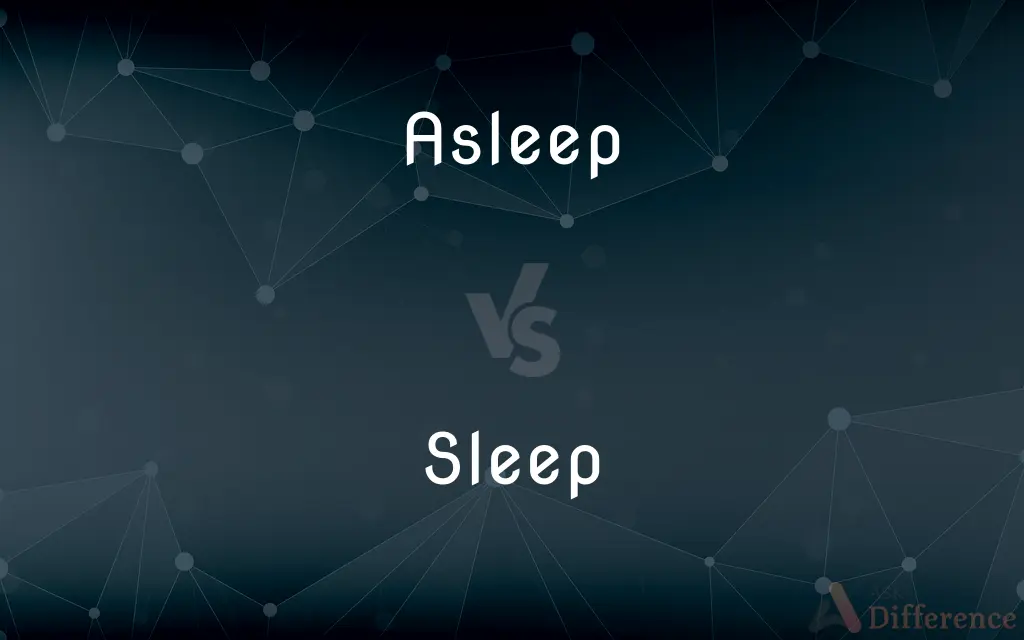Asleep vs. Sleep — What's the Difference?
By Tayyaba Rehman — Updated on October 31, 2023
Asleep describes the state of being, while sleep refers to the act or process.

Difference Between Asleep and Sleep
Table of Contents
ADVERTISEMENT
Key Differences
Asleep is an adjective describing a state of unconsciousness during which the body rests and recovers. It implies that someone is not awake and is in the condition of sleeping. Sleep, on the other hand, is primarily a noun and verb referring to the act or process of resting in a state of reduced consciousness. It represents both the action and the state itself.
Asleep is used to describe someone who is currently in the state of sleep. It cannot function as a verb. For example, one cannot say “I am going to asleep,” but can say “I am asleep.” Sleep, however, can be a verb as in “I need to sleep” or a noun as in “I need more sleep.”
Asleep carries the implication of being in the midst of the sleep state, often suggesting a passive or inactive condition. It cannot be used to describe the act of entering into sleep. Sleep, when used as a verb, specifically refers to the action of entering into the state of rest, and as a noun, it denotes the duration or quality of that state.
Asleep is commonly used in phrases like “fall asleep” or “asleep at the wheel,” where it modifies another word to describe a condition. Sleep, conversely, can stand alone as a noun or be used as a verb to describe the action of obtaining rest, as in “sleeping well” or “go to sleep.”
Asleep is never used in a plural form because it’s an adjective. It doesn’t have a past tense because it’s not a verb. Sleep can be used in different tenses and can be plural when used as a noun, as in “I had several interrupted sleeps last week.”
ADVERTISEMENT
Comparison Chart
Part of Speech
Adjective
Noun, Verb
Usage
Describes the state of being asleep
Refers to the act or process
Action vs. State
State only
Both action and state
Verb Form
Not used as a verb
Commonly used as a verb
Plurality and Tenses
No plural form, no tenses
Plural and tense variations
Compare with Definitions
Asleep
Dormant; inactive.
The volcano has been asleep for centuries.
Sleep
A natural state of rest.
I need more sleep to function well.
Asleep
In a state of sleep.
She was asleep by 10 PM.
Sleep
The resting state in which the body is not active.
Babies require a lot of sleep.
Asleep
In a state of sleep; sleeping.
Sleep
A state of inactivity or dormancy.
The computer is in sleep mode.
Asleep
Inactive; dormant.
Sleep
Sleep is a naturally recurring state of mind and body, characterized by altered consciousness, relatively inhibited sensory activity, reduced muscle activity and inhibition of nearly all voluntary muscles during rapid eye movement (REM) sleep, and reduced interactions with surroundings. It is distinguished from wakefulness by a decreased ability to react to stimuli, but more reactive than a coma or disorders of consciousness, with sleep displaying different, active brain patterns.
Asleep
Indifferent
Politicians who are asleep to the needs of their constituents.
Sleep
A natural periodic state of rest for the mind and body, in which the eyes usually close and consciousness is completely or partially lost, so that there is a decrease in bodily movement and responsiveness to external stimuli. During sleep the brain in humans and other mammals undergoes a characteristic cycle of brain-wave activity that includes intervals of dreaming.
Asleep
Numb, especially from reduced circulation of blood to a limb
My leg is asleep.
Sleep
A period of this form of rest.
Asleep
Dead.
Sleep
A state of inactivity resembling or suggesting sleep; unconsciousness, dormancy, hibernation, or death.
Asleep
In or into a state of sleep.
Sleep
A state in which a computer shuts off or reduces power to its peripherals (such as the display or memory) in order to save energy during periods of inactivity.
Asleep
In or into a state of apathy or indifference.
Sleep
(Botany) The folding together of leaflets or petals at night or in the absence of light.
Asleep
Into a state of numbness.
Sleep
A crust of dried tears or mucus normally forming around the inner rim of the eye during sleep.
Asleep
Into the sleep of the dead.
Sleep
To be in the state of sleep or to fall asleep.
Asleep
In a state of sleep; also, broadly, resting.
I was asleep when you called.
Never disturb a man asleep.
Sleep
To be in a condition resembling sleep.
Asleep
(slang) Inattentive.
How could you miss that? Were you asleep?
Sleep
To pass or get rid of by sleeping
Slept away the day.
Went home to sleep off the headache.
Asleep
(of a body part) Having a numb or prickling sensation accompanied by a degree of unresponsiveness.
My arm fell asleep. You know, like pins and needles.
Sleep
To provide sleeping accommodations for
This tent sleeps three comfortably.
Asleep
(euphemistic) Dead.
Sleep
(intransitive) To rest in a state of reduced consciousness.
You should sleep eight hours a day.
Asleep
In a state of sleep; in sleep; dormant.
Fast asleep the giant lay supine.
By whispering winds soon lulled asleep.
Sleep
(transitive) To be slumbering in (a state).
To sleep a dreamless sleep
Asleep
In the sleep of the grave; dead.
Concerning them which are asleep . . . sorrow not, even as others which have no hope.
Sleep
To achieve or make happen by manner of sleep.
Sleep your way to good health.
He hoped to sleep his troubles away.
Asleep
Numbed, and, usually, tingling.
Leaning long upon any part maketh it numb, and, as we call it, asleep.
Sleep
To have sexual intercourse (see sleep with).
Last night we slept together for the first time.
Asleep
In a state of sleep;
Were all asleep when the phone rang
Fell asleep at the wheel
Sleep
(idiomatic) To earn by sexual favors.
Asleep
Lacking sensation;
My foot is asleep
Numb with cold
Sleep
(transitive) To accommodate in beds.
This caravan can sleep four people comfortably.
Asleep
Dead;
He is deceased
Our dear departed friend
Sleep
(intransitive) To be careless, inattentive, or unconcerned; not to be vigilant; to live thoughtlessly.
Asleep
Into a sleeping state;
He fell asleep
Sleep
(intransitive) To be dead; to lie in the grave.
Asleep
In the sleep of death
Sleep
(intransitive) To be, or appear to be, in repose; to be quiet; to be unemployed, unused, or unagitated; to rest; to lie dormant.
A question sleeps for the present; the law sleeps
Asleep
Lacking sensation; numb.
My arm is asleep.
Sleep
To wait for a period of time without performing any action.
After a failed connection attempt, the program sleeps for 5 seconds before trying again.
Asleep
Inattentive or negligent.
The guard was asleep at his post.
Sleep
To place into a state of hibernation.
Asleep
Dead (euphemism).
He is now asleep forever.
Sleep
To spin on its axis with no other perceptible motion.
When a top is sleeping, it is spinning but not precessing.
Sleep
To cause (a spinning top or yo-yo) to spin on its axis with no other perceptible motion.
Sleep
(uncountable) The state of reduced consciousness during which a human or animal rests in a daily rhythm.
I really need some sleep.
We need to conduct an overnight sleep test to diagnose your sleep problem.
Sleep
An act or instance of sleeping.
I’m just going to have a quick sleep.
Sleep
A night.
There are only three sleeps till Christmas!
Sleep
(uncountable) Rheum, crusty or gummy discharge found in the corner of the eyes after waking, whether real or a figurative objectification of sleep (in the sense of reduced consciousness).
Wipe the sleep from your eyes.
Sleep
A state of plants, usually at night, when their leaflets approach each other and the flowers close and droop, or are covered by the folded leaves.
Sleep
The hibernation of animals.
Sleep
To take rest by a suspension of the voluntary exercise of the powers of the body and mind, and an apathy of the organs of sense; to slumber.
Watching at the head of these that sleep.
Sleep
To be careless, inattentive, or uncouncerned; not to be vigilant; to live thoughtlessly.
We sleep over our happiness.
Sleep
To be dead; to lie in the grave.
Them also which sleep in Jesus will God bring with him.
Sleep
To be, or appear to be, in repose; to be quiet; to be unemployed, unused, or unagitated; to rest; to lie dormant; as, a question sleeps for the present; the law sleeps.
How sweet the moonlight sleep upon this bank!
Sleep
To be slumbering in; - followed by a cognate object; as, to sleep a dreamless sleep.
Sleep
To give sleep to; to furnish with accomodations for sleeping; to lodge.
Sleep
A natural and healthy, but temporary and periodical, suspension of the functions of the organs of sense, as well as of those of the voluntary and rational soul; that state of the animal in which there is a lessened acuteness of sensory perception, a confusion of ideas, and a loss of mental control, followed by a more or less unconscious state.
O sleep, thou ape of death.
Sleep
A natural and periodic state of rest during which consciousness of the world is suspended;
He didn't get enough sleep last night
Calm as a child in dreamless slumber
Sleep
A torpid state resembling sleep
Sleep
A period of time spent sleeping;
He felt better after a little sleep
There wasn't time for a nap
Sleep
Euphemisms for death (based on an analogy between lying in a bed and in a tomb);
She was laid to rest beside her husband
They had to put their family pet to sleep
Sleep
Be asleep
Sleep
Be able to accommodate for sleeping;
This tent sleeps six people
Sleep
A period of resting with closed eyes.
He had a peaceful sleep last night.
Sleep
A condition of body and mind.
Sleep is essential for health.
Common Curiosities
Does 'sleep' have different tense forms?
Yes, it does when used as a verb.
What part of speech is 'asleep'?
It's an adjective.
Can 'asleep' refer to numbness?
Yes, as in "My leg is asleep."
Can 'sleep' refer to inactivity in devices?
Yes, as in "sleep mode."
Is 'asleep' used to describe the act of falling asleep?
No, it describes being in the state of sleep.
Is 'asleep' ever used metaphorically?
Yes, like in "asleep at the wheel."
Can 'asleep' be used as a verb?
No, it's only an adjective.
Can 'asleep' be used in the plural form?
No, it's always singular.
Can 'sleep' be both a noun and a verb?
Yes, it functions as both.
Can 'sleep' describe the quality of rest?
Yes, as in "good sleep."
Is 'sleep' used to describe a period of rest?
Yes, it describes both the act and the period of resting.
Does 'sleep' ever refer to a dormant state?
Yes, especially in biological or technical contexts.
Are 'asleep' and 'sleep' interchangeable?
No, they serve different grammatical functions and contexts.
Is 'asleep' used in the phrase 'fall asleep'?
Yes, it's a common usage.
Does 'sleep' have a verb form for past tense?
Yes, it's "slept."
Share Your Discovery

Previous Comparison
Tiger vs. Cow
Next Comparison
Logo vs. SloganAuthor Spotlight
Written by
Tayyaba RehmanTayyaba Rehman is a distinguished writer, currently serving as a primary contributor to askdifference.com. As a researcher in semantics and etymology, Tayyaba's passion for the complexity of languages and their distinctions has found a perfect home on the platform. Tayyaba delves into the intricacies of language, distinguishing between commonly confused words and phrases, thereby providing clarity for readers worldwide.
















































